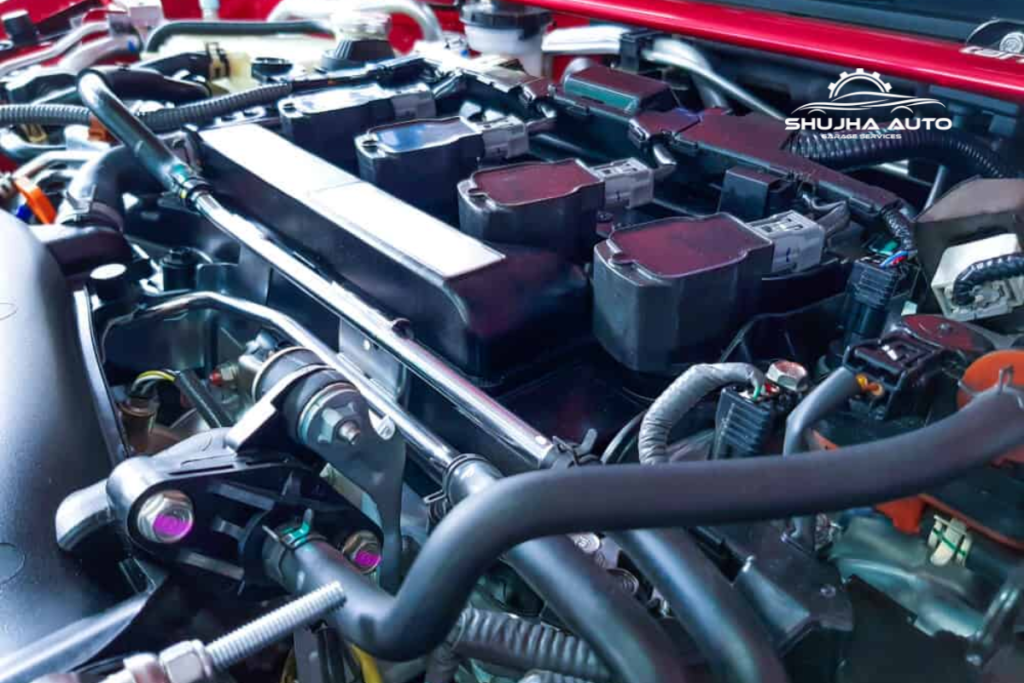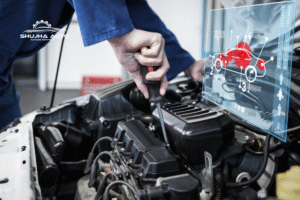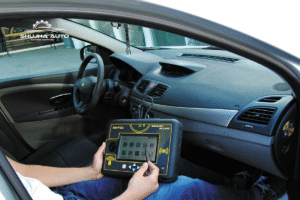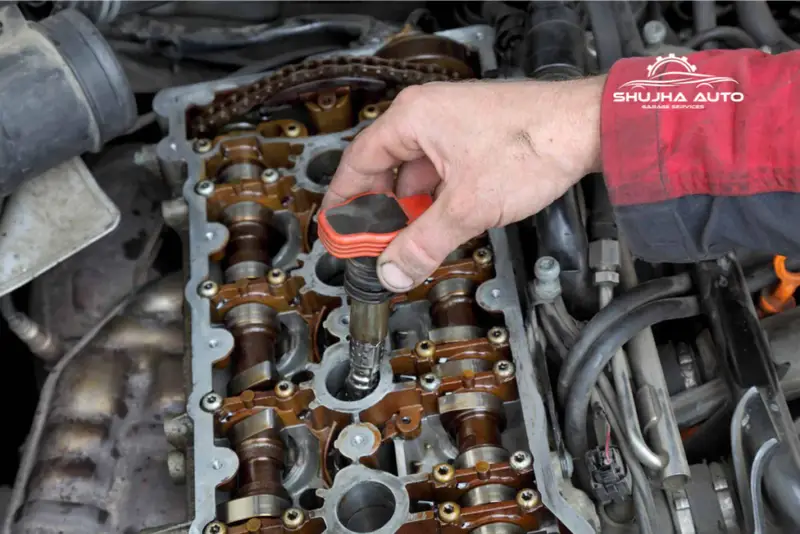If you’ve ever had to deal with ignition coil failure more than once, you’re not alone. Many car owners get frustrated with their ignition systems needing constant fixes. Ignition coils failing can happen for many reasons. Ignoring these problems can hurt your car’s performance, make it less fuel-efficient, and even increase harmful emissions.
It’s important to know why ignition coils fail to fix your car correctly. By learning the signs of a bad ignition coil, you can avoid costly repairs later. Shujha Auto Garage is ready to help with reliable maintenance and advice.
Key Takeaways
- Repeated ignition coil failures are a common issue for car owners.
- Understanding the reasons for ignition coil failure is crucial for effective troubleshooting.
- Failing ignition coils can negatively impact your vehicle’s performance and efficiency.
- Prompt attention to ignition coil issues can prevent costly repairs.
- Shujha Auto Garage offers expert services for ignition system problems.
Understanding Ignition Coils
Ignition coils are key to your car’s ignition system. They turn the battery’s 12 volts into thousands of volts, which is needed to ignite the air-fuel mixture in your engine’s cylinders. Without working ignition coils, starting your car can be rigid or slow.
There are two main types of ignition coils: single-coil and dual-coil systems. Single-coil systems use one coil for all cylinders, while dual-coil systems have one coil for each pair of cylinders. Knowing the difference helps you understand how each type affects your car’s performance and reliability.
Understanding the basics of the ignition system helps you spot problems early. Knowing how crucial ignition coils are shown their importance in keeping your engine running well. This knowledge lets you take better care of your car, ensuring it runs smoothly and lasts longer.
Signs That Your Ignition Coils Are Failing
If you think your car’s ignition system might be having trouble, you must know the symptoms of failing ignition coils. Ignition coils are key to your engine running well. When they start to fail, you’ll see some warning signs of ignition coil issues.
- Engine Misfires: A big sign of trouble is when your engine doesn’t run smoothly. If it stutters when accelerating or sitting still, your ignition coils are not working right.
- Decreased Fuel Efficiency: If your car suddenly uses more gas than usual, it could be because your ignition coils aren’t sparking well enough for good combustion.
- Difficulty Starting: If your car takes a long time or has trouble starting, it might be a sign that your ignition coils are failing.
- Illuminated Check Engine Light: An active check engine light usually means a problem with the ignition system. You should take this warning seriously, as ignoring it could cause more significant issues.
Spotting these signs early can help avoid damage to other parts of your ignition system. If you notice any of these symptoms, getting help from experts like those at Shujha Auto Garage for a detailed check-up is best.
Location: Please Visit Our Shujha Auto Garage
Common Causes of Ignition Coil Failure
Ignition coil failure can happen for many reasons, affecting your car’s performance. Knowing these ignition coil failure causes is essential for good car care. Overheating is a big problem caused by using your vehicle in hot weather. This heat can damage the coil’s insulation, making it fail.
Wear and tear also cause ignition coil problems. The coils wear out over time, leading to malfunctions. Electrical issues like voltage spikes or imperfect connections can harm the coil’s performance.
Environmental factors like humidity and moisture can also damage ignition coils. If you ignore these, your coils might fail early. Not keeping up with regular car checks and tune-ups can make these problems worse. Knowing these causes helps you take steps to keep your ignition coils working well and your car reliable.
Why Do My Ignition Coils Keep Failing?
If you’re dealing with ignition coil problems, you’re not alone. Many people face the hassle of replacing ignition coils often. Knowing why this happens can help you fix the issue.
Using low-quality parts is a big problem. Cheap or fake ignition coils don’t work well and fail quickly. Also, bad spark plugs can mess up your ignition coils, making them not work right.
Look at your car’s electrical system, too. Bad connections or wiring shorts can stress your ignition coils. It’s essential to check these things carefully. Ignoring these issues can make replacing coils a never-ending task.
Talking to car experts can give you more help. They can find out why your coils keep failing. This way, you can fix the problem right and avoid wasting time.
Diagnosing Ignition Coil Problems
Accurately diagnosing ignition coil issues is crucial to keeping your vehicle running well. Start by visually inspecting the coils for damage. Also, check the connections and wiring for corrosion or wear that may be affecting performance.
Tools like OBD-II scanners can help you find fault codes from your vehicle’s computer. These codes can reveal underlying problems with the ignition system. Next, a resistance test on the coils will be performed to see if they work correctly.
If you’re not sure how to diagnose ignition coil problems, don’t worry. Professional mechanics, like those at Shujha Auto Garage, can help. They’ll guide you through the process and improve your understanding of ignition coil health.

Replacing Ignition Coils: A How-To Guide
Replacing ignition coils might seem difficult, but it’s doable with the right tools and some guidance. First, prepare your tools: a socket wrench, torque wrench, screwdrivers, and gloves for safety. Make sure the new coils fit your car’s make and model.
Start by disconnecting the battery to avoid electrical shocks. Then, remove any covers or parts that block the ignition coils. Carefully remove the electrical connectors from the old coils and unscrew them from the engine.
Now, put in the new coils by doing the opposite of what you did before. Ensure each coil is tight and the electrical connectors are back on. After that, reconnect the battery. Start your engine and listen for any odd sounds to check if everything works right.
This DIY project can save you money and make you feel proud. Always check your car’s manual for instructions to ensure a safe and effective installation.
Maintaining Your Ignition System
Keeping your ignition system in good shape is key to your vehicle’s long life and performance. Regular checks on ignition parts can prevent sudden failures and keep your car running smoothly. Inspect the ignition coils, spark plugs, and other parts regularly.
It is important to keep your engine area clean and dry. Moisture and dirt can cause electrical problems that harm ignition. Cleaning the engine bay often helps spot issues early.
Changing spark plugs on time is vital for your ignition coils to last longer. Bad spark plugs stress coils, causing them to fail early. Always check the car manual for when to replace spark plugs.
Getting regular maintenance from trusted places like Shujha Auto Garage is essential. Tune-ups do more than check the ignition system. They make sure everything works right. With proper care, your ignition coils will last longer and have a smooth ride.
Conclusion
Knowing how to care for your ignition coils is crucial for your car’s performance. We’ve talked about common signs of ignition coil problems and their causes. By watching for these signs, you can catch issues early and avoid big breakdowns.
Regular maintenance is vital for a healthy ignition system. By following our tips, you can keep your ignition coils working well for longer. Taking care of your ignition coils now can save you from future problems and keep your car running smoothly.
If you’re having trouble with your ignition coils, don’t wait to get help. The experts at Shujha Auto Garage are ready to assist you. They can help fix your car’s issues and ensure it runs well.
FAQ
What are ignition coils, and why are they important?
Ignition coils are key parts of your car’s ignition system. They turn the battery’s 12 volts into high voltage, which is needed to start the engine’s cylinders. This high voltage affects how well your engine runs and how much fuel it uses.
What are the common signs that my ignition coils are failing?
Engine misfires, lower fuel efficiency, difficulty starting your car, and an illuminated check engine light are signs of failing ignition coils.
Knowing these signs early can help avoid more significant problems and save you money on repairs.
What causes ignition coils to fail?
Ignition coils can fail from overheating, wear, electrical problems, and bad connections. Humidity, moisture, and corrosion can also harm them. Not keeping up with regular maintenance, like tune-ups, can also cause them to fail early.
How can I diagnose if my ignition coils are malfunctioning?
Start with a visual inspection to check if your ignition coils are failing. Use tools like OBD-II scanners to look for fault codes. Check the connections and wiring, and do resistance tests to see if the coils work correctly.
What should I do if my ignition coils keep failing?
If your ignition coils keep failing, consider the quality of the parts you’re using. Check the spark plugs and your car’s electrical system. Finding the real cause is more important than replacing the coils repeatedly.
Can I replace my ignition coils myself?
Yes, you can replace ignition coils yourself. Just follow a step-by-step guide. Make sure you have the right tools and safety gear. But if you’re not sure, it’s best to get help from experts at Shujha Auto Garage.
How can I maintain my ignition system to prevent coil failures?
To keep your ignition system working well, check it regularly, replace spark plugs on time, and keep your engine clean and dry. Getting regular maintenance and tune-ups from Shujha Auto Garage can also help your coils last longer.








